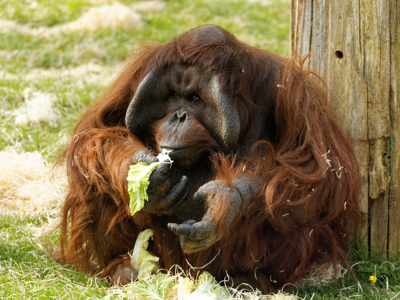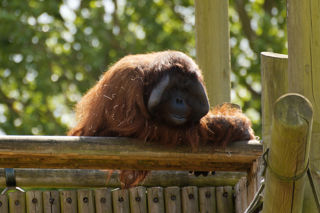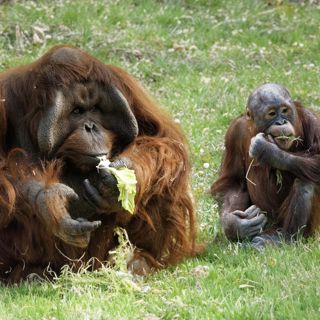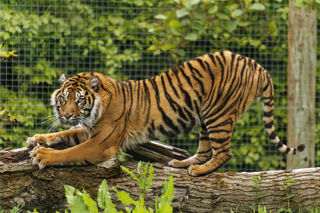
Bornean Orangutan
Orangutans are one of the four Great Apes, along with gorillas, chimpanzees and bonobos. Great apes are different from monkeys in that apes are bigger, tail-less and more intelligent. If it looks like a monkey but doesn’t have a tail, it’s an ape!

Orangutans are the only great ape outside of Africa and the only great ape that spends the majority of their time up in the trees - they are the biggest arboreal (tree-living) mammal in the world!
Orangutans are frugivores, meaning they mainly eat fruit - fruit makes up over 60% of their diet. They eat more plant species than other great apes – orangutans have been found to eat over 1600 different types of plant!
As fruit eaters, orangutans play a key role in keeping rainforests healthy and flourishing – they do this by dispersing seeds. When orangutans eat, they swallow the seeds whole. They then travel long distances and poop the seeds out in new places, which means the seeds have a better chance of growing into new rainforest plants and trees.

There are three types of Orangutans, which are found in tropical rainforests on the islands of Sumatra and Borneo in Southeast Asia. Here at Twycross Zoo, we have a family of Bornean Orangutans.
Did you know?
- Male orangutans develop ‘flanges’ (large cheeks) around their face, as a sign of age and their social hierarchy – the bigger the flanges, the bigger the social status!
- Orangutans’ feet are like another pair of hands! Instead of a big toe, one of their toes is more similar to a thumb, meaning they are excellent climbers and can pick things up with their feet.
- Orangutans create a new nest to sleep in every night, high up in the trees. Scientists use these nests to count and figure out how many orangutans there are in an area!

Bornean orangutans are critically endangered, meaning they are at very high risk of extinction. This is due to:
- Loss of their rainforest habitat (deforestation and forest fires): 80% of suitable orangutan habitat has been lost in the last 30 years, primarily due to clearing of rainforest for agriculture. Orangutans spend their lives in trees, so without trees they struggle to move around, get the food they need and create nests.
- Slow breeders: As a close relative to humans, orangutans spend a lot of time caring for their young. They have one baby every 6-8 years. This makes it more difficult for the population to recover if lots of orangutans are being lost due to deforestation.
What is Twycross Zoo doing
- Breeding Programme: Twycross Zoo works closely with other zoos to create a healthy captive population of Bornean orangutans that could be used if the wild population ever goes extinct. This is known as the European Ex-situ Breeding Programme (EEP).
- Borneo Nature Foundation is one of Twycross Zoo’s conservation partners, working on the ground in Borneo to protect key areas of tropical rainforest and safeguard wildlife and indigenous cultures.
Key Facts:
- Scientific name: Pongo pygmaeus pygmaeus
- Range: Indonesia (Kalimantan); Malaysia (Sarawak, Sabah)
- Habitat: Rainforest (Lowland)
- Diet: Frugivore
- IUCN Red List: Critically Endangered
- What is Twycross Zoo doing? Breeding Programme (EEP), Conservation Partner (BNF)
Do you have any questions about Bornean orangutans? Feel free to ask one of our Education Rangers or Education Officers during your visit to Twycross Zoo.

SUPPORT OUR ANIMALS
If you're looking for an alternative way to donate to Twycross Zoo, you can help support our animals and our zoo keepers by purchasing something from our Amazon Wishlist!
Updated regularly by our zoo keepers, the items on the list help to provide enrichment for our animals and keep their habitats well maintained.
Every donation helps us as a conservation charity.

